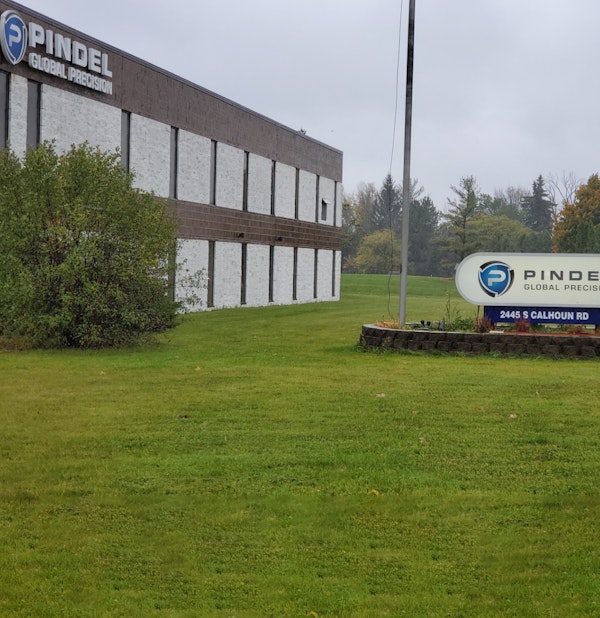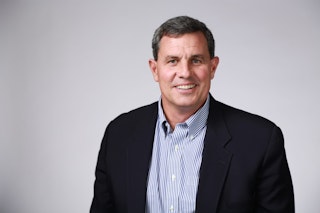Pivoting to Producing Ventilator Parts — in Record Time
Bill Berrien’s company specialized in producing precision machined parts — exactly what is needed to create critical components for ventilators. And as the COVID-19 crisis caused a ventilator shortage and crippled global supply chains, Berrien knew his company could step up and help.
 Pindel Global Precision (via Bill Berrien) has pivoted to machining components for ventilators.
Pindel Global Precision (via Bill Berrien) has pivoted to machining components for ventilators.
Serving others has always been a part of Bill Berrien’s story. Berrien, a 2019 Presidential Leadership Scholar and CEO of Pindel Global Precision, was a Navy SEAL Officer for nine years, leading special operations units globally, before he helped run and scale smaller companies. His latest mission is to help save lives from COVID-19.
Soon after the virus appeared in the United States, Bill and the team at Pindel in Wisconsin shifted production at their manufacturing facility to make critical ventilator parts. Via email, between ventilator manufacturer orders, Bill was gracious enough to explain more about how Pindel has helped answer the call.
What is Pindel Global Precision doing right now to help with efforts to get more ventilators to those in need?
Pindel Global Precision, a veteran-owned, contract manufacturer of precision machined components located near Milwaukee, Wisconsin, has pivoted to make components for ventilator manufacturers globally. In early March, with the ramp-up in COVID-19 cases in the U.S., I put out the word thru LinkedIn that Pindel Global Precision would be willing to manufacture components for ventilators, at cost if necessary, to meet the projected need for ventilators in ICUs across the country (and the world).
At that point in time, Pindel did not have any ventilator customers, however Pindel is a contract manufacturer of precision machined parts, which means that its business is to use very sophisticated CNC (computer numerical control, a method of precise machining or 3D printing) equipment to machine other companies’ complex components, and ventilator components would be well within the company’s capabilities.
In ensuing weeks, Pindel was awarded emergency purchase orders by several ventilator manufacturers, ultimately five different manufacturers. Each wave of purchase orders required us to plan, create, and ship those components, in some cases within just days — which, in our industry, is a very quick turnaround time for parts this complex and never-before-seen by the company making them.
We are now the single source globally for those components, stocking additional pieces of each in case demand should continue to grow in coming months, but otherwise available for future use.
What inspired you to do this?
Our inspiration was a desire to contribute to the fight against COVID-19 in light of yawning gaps in our country’s preparations for the pandemic. Pindel Global Precision has the capabilities to make a difference (the equipment, the skilled workforce, and the collective mindset) and the willingness to lean in.
At the time, many of the supply chains for these ventilators and components were in Asia, but with COVID-19 striking that region first, those lengthy supply chains were dramatically disrupted. Armed with the latest CNC technology and skilled workforce, we were able to provide this solution in a very short period of time.
At the time, many of the supply chains for these ventilators and components were in Asia, but with COVID-19 striking that region first, those lengthy supply chains were dramatically disrupted.
 Pindel Global Precision in Milwaukee, Wisconsin (via Bill Berrien)
Pindel Global Precision in Milwaukee, Wisconsin (via Bill Berrien)
What role did social networks play?
LinkedIn has turned out to be an amazing vehicle for communicating business updates and intentions, and then, thru the ‘tagging’ mechanism, bring those updates directly to the attention of the target audience. Additionally, the algorithms inside LinkedIn accelerated the presentation of these posts to my connections, to companies targeted in the posts, and to other interested parties, some second and third order connections. Then, the postings led to articles being written on our efforts from local publications as well as CNBC and others. We then posted those articles on LinkedIn, further accelerating the awareness-building and leading to more ventilator contacts.
What’s next?
For Pindel, the next opportunity we are embarking on is a push to the manufacture of even more intricate medical components, including hardware that will be implanted in the human body – bone screws, for example – and medical tools.
What’s giving you hope right now?
In trying to see the silver lining of this pandemic, I believe we are going to see 1) a reconsideration of lengthy, global supply chains in favor of manufacturing in this hemisphere, if not solely in this country; and 2) an opportunity to provide outstanding opportunities to individuals in this country to participate in advanced manufacturing alongside automation, artificial intelligence, and data analysis to bolster and grow our middle class.
I foresee a bright future ahead for advanced manufacturing in this country, and I am happy to be a part of that and help lead within it where I can.
I also can’t express how impressed I am with my Presidential Leadership Scholar (PLS) colleagues who are front and center in the healthcare crisis of COVID-19. Their sacrifice and leadership are amazing. As well, I am incredibly inspired by my PLS colleagues who are working to alleviate the suffering and dislocation of those less fortunate members of our society who have been impacted by this pandemic.
I foresee a bright future ahead for advanced manufacturing in this country, and I am happy to be a part of that and help lead within it where I can.
The Catalyst believes that ideas matter. We aim to stimulate debate on the most important issues of the day, featuring a range of arguments that are constructive, high-minded, and share our core values of freedom, opportunity, accountability, and compassion. To that end, we seek out ideas that may challenge us, and the authors’ views presented here are their own; The Catalyst does not endorse any particular policy, politician, or party.

